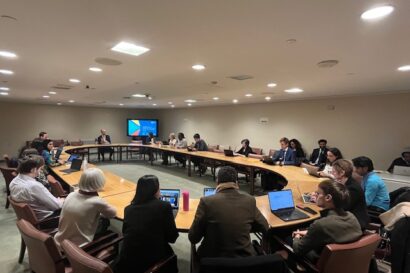There is good news in the agenda for the Third Financing for Development Conference to be held in Addis Ababa on 13-16th July. For the first time, domestic resource mobilization is more prominent than international aid. The emphasis is on the ways in which the governments of developing countries can raise and leverage more financial resources for development.
The bad news is that the Facilitators of the meeting are proposing tax targeting: inviting the governments of those developing countries that do not currently meet a particular revenue collection threshold to commit to raising more.
The Zero Draft of the Outcome Document suggests that “… Countries with government revenue below 20 per cent of GDP agree to progressively increase tax revenues, with the aim of halving the gap towards 20 per cent by 2025.”
It would be a great mistake to encourage quantitative tax targeting of any kind. It would be like reintroducing the kind of production targets that did so much damage in the former Soviet Union. We know that when a television manufacturing enterprise is rewarded according to the extent to which it achieves or exceeds a target of producing X thousand TV sets annually, its products are best shunned. They are unlikely to embody much new technology. They are likely to malfunction or burst into flames.
More specifically, there are three reasons why tax targeting would be wrong.
First, it is already a significant problem in developing countries that most tax agencies are already subject to a single performance measure: the extent to which they achieve the cash targets for revenue raising set by ministries of finance.
Tax agencies are rarely rewarded for efforts to engage more productively with taxpayers, to make the taxpaying experience easier and more pleasant, to reduce the extent of corruption, or to redesign their own structures and processes to make tax collection more effective. They give priority to meeting the collection target. That may involve a second visit from the taxman toward the end of the financial year in order to squeeze out a little more money. This kind of behaviour simply reinforces suspicion and mistrust.
Improving the relationships between tax agencies and taxpayers is central to any long-term improvement in tax compliance and therefore to any long-term increase in the ratio of government revenue to GDP. Diversifying the performance criteria for tax collectors is vital. Some developing countries are making progress. Any kind of international blessing for archaic practices would be a mistake – and perverse in terms of the Sustainable Development Goals.
Second, increasing revenue collection will likely in some countries lead to an increase in poverty.
The extent to which this is true will depend upon the ways in which the additional public revenue is raised and spent.The draft Outcome Documentof the Financing for Development Conference of course pays attention to this issue. But the implementation of any agreement that emerges from that conference will be in the hands of individual governments.
We cannot guarantee that, whether by default or by design, some of them will not end up taxing the poor more heavily and spending the revenue on public service salaries rather than on social services. Even if governments spend all their additional revenue on social services for the poor, services are not a substitute for food.
It is not uncommon that the net effect of all governments taxing and spending is to leave the poor worse off.
In Ethiopia, for example, the World Bank’s poverty assessment states that “… Poor households pay taxes—both direct and indirect—and the transfers and benefits they receive do not compensate all households for the taxes they have paid. As a result,…, one in four households are impoverished (either made poor or poor households made poorer) after direct taxes are paid and transfers received … .”
In some countries, including Armenia, Bolivia, Brazil, El Salvador, Ethiopia and Guatemala (PDF), the number of poor people who are made poorer through the taxing and spending activities of governments exceeds the number who actually benefit from those activities. The big risk in setting tax targets is that governments will then strive to reach them – and in the process impoverish poor people even further.
These first two objections to tax targeting relate to the ways in which it might actually undermine the Sustainable Development Goals.
The third objection is that, in many cases, the figures used to assess performance in relation to these targets may be almost meaningless.
Tax targets are set in terms of revenue collection as a proportion of GDP. But we know that the GDP figures for many low income countries are of very poor quality. We have seen some drastic revaluations of GDP in recent years.
When in 2013 it was calculated that Ghana’s GDP was actually 60% more than had previously been thought, its apparent revenue performance – the ratio of tax collections to GDP – plummeted.
Governments already play some strategic games with their GDP estimates. Sometimes it feels good to become re-classified as a middle income country. But sometimes it seems wiser to remain officially low income and retain various aid entitlements.
The introduction of tax targets would introduce a new factor into the calculation, and further undermine the incentives to report GDP accurately. The “tax” number is often even more suspect. What about governments that receive significant incomes from the extraction and export of oil, gas or minerals? Their apparent ‘tax performance’ may vary from year to year purely as a result of big swings in world market prices for their commodity exports.
Figures on revenue collections are themselves vulnerable to various kinds of accounting and reporting problems and manipulation. For example: it was recently revealed that the Pakistan Board of Revenue has for many years given the appearance of meeting its annual tax collection targets by borrowing large sums of money, in the form of “advanced taxes”, from the big banks.
Accounting and reporting games are already being played around tax collection targets. If the international community were to popularise the idea that an improved ratio of tax collection to GDP is intrinsically a good thing, we can expect more such games. This too can only undermine the reputation and sense of professionalism within revenue collection agencies.
It would be a good idea if the governments of many developing countries were encouraged and supported to raise more domestic revenue in order to finance genuinely sustainable development goals. But the amount of additional revenue that could usefully be raised and spent on development goals varies widely from country to country.
Uniform tax targets of any kind, however qualified and indicative, do not make sense. They could do damage.




